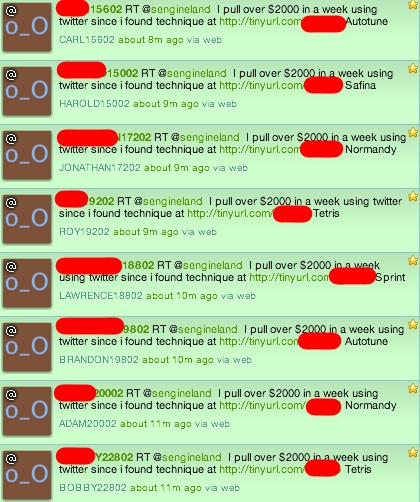Twitter’s Real Time Spam Problem
And so real-time search begets real-time spam. We knew this would happen, but it’s annoying and becoming a growing problem. Question is, will Twitter do anything about it, beginning with removing its “Trends” feature?I got an up close & personal look at how bad Twitter “trend spam” has become when this week, our SMX Advanced […]
And so real-time search begets real-time spam. We knew this would happen, but it’s annoying and becoming a growing problem. Question is, will Twitter do anything about it, beginning with removing its “Trends” feature?I got an up close & personal look at how bad Twitter “trend spam” has become when this week, our SMX Advanced search marketing conference became a trending topic.
Trends are topics that are gaining attention on Twitter, usually identified by the use of a common word. For example, at SMX Advanced, attendees were told to add the hashtag of “#smx” to the end of their tweets, as a way to help those looking for real time news about the show to have a common word to search on.
Since there were many tweets containing #smx, that helped #smx to become a trending topic. As such, it showed up as a link on the home page of Twitter Search and in the trends links along the right-hand side of someone’s Twitter account, when they’re visiting Twitter on the web.
Unfortunately, anyone searching for SMX news on Twitter quickly discovered how useless this was. For one thing, Twitter search is still suffering delays, where “real time” can actually mean a 20 minute or longer delay until a tweet appears.
For another, because of how prominent trends are — people will click trends links out of curiosity — people are putting out tweets that contain the trending words but which have nothing to do with the topic.
For example, consider this tweet:
The beginning of it seems to make no sense:
#e3 air france sims 3 project natal new moon #wiebe #smx sony hummer #radio4minus1letter
But if you know trends, then you understand. Those were all the trending topics on Twitter at that time. But throwing in all these words, this person showed up in front of the curious, polluting the real-time stream for his goal at the end:
I need 100 followers by midnight! Help me!
How nice. But there are far worse examples. Consider:
In that example, someone’s dropping a link after the trend words, making you think the link is somehow related to the trending topics. OK, making you think that if you’re not realizing how odd that tweet looks — but still, it sucks. Click on the link, and you get sent to some MP3 site. But you could be sent anywhere, including a malware site.
In another example, I saw a tweet that used a real comment made by someone at SMX, except that they added a link to their eBay option. Clever, because the tweet seemed about as legit as you could want — but sucky, because it was spam.
Today, it got even more personal. Our @sengineland account is being pounded with retweet spam. Someone is using multiple accounts to retweet things we’ve said — except we’ve never said what they’re putting out:
They’ve done this so much that our replies are becoming useless, flooded with this garbage:
But the real issue is that they’re also including trending topic words, autotune, which is on the front of Twitter Search right now:
That lets them get in front of a larger audience via Twitter Search plus tricks people into clicking on the links, since they appear to be retweeting something a trusted source put out.
It’s all pretty sucky, and those who know search spam predicted this would happen when Twitter added trends to its home page. I’d point to my own tweet about this back then, and Google web spam chief Matt Cutts joking back with me about it, but Twitter Search is so broken that I can’t find anything written from my own account.
For all the love real time search is getting, old timers know well why search engines long ago stopped doing unfiltered real time additions to their indexes. It made them too easy to spam. For a brief moment in time, Infoseek allowed for “instant updates” or additions of web pages. People, to be blunt, spammed the hell out of Infoseek with this.
It’s just going to get worse, and Twitter needs to put some solutions in place. For a start, they should pull trends. By listing trending topics, they’re in turn helping to generate all this spam, some of which may harm their own users. Pull trends until some actual spam protection is in place.
And what spam protection might that be? Some quick thoughts:
- Accounts less than a day old don’t get to show up in Twitter Search and/or show up for trending topics
- Figure a reputation score for accounts and only let those appear in for trending topics
- Partner with a service for malware detection, so that any links Twitter puts out are analyzed to be safe
Finally, a note to those who are doing this. The US Federal Trade Commission has pretty strict rules on misleading consumers. Putting out a tweet on a topic with a link, when you have no relationship to that topic, is misleading. It’s even more so to pretend to retweet someone. It’s fairly easy to see who is benefiting from these tweets and hold them accountable. In the case of our retweet spam, I’ve sent notice to the site involve that if it continues, I’ll file an FTC complaint against them.
Opinions expressed in this article are those of the guest author and not necessarily Search Engine Land. Staff authors are listed here.
Related stories




